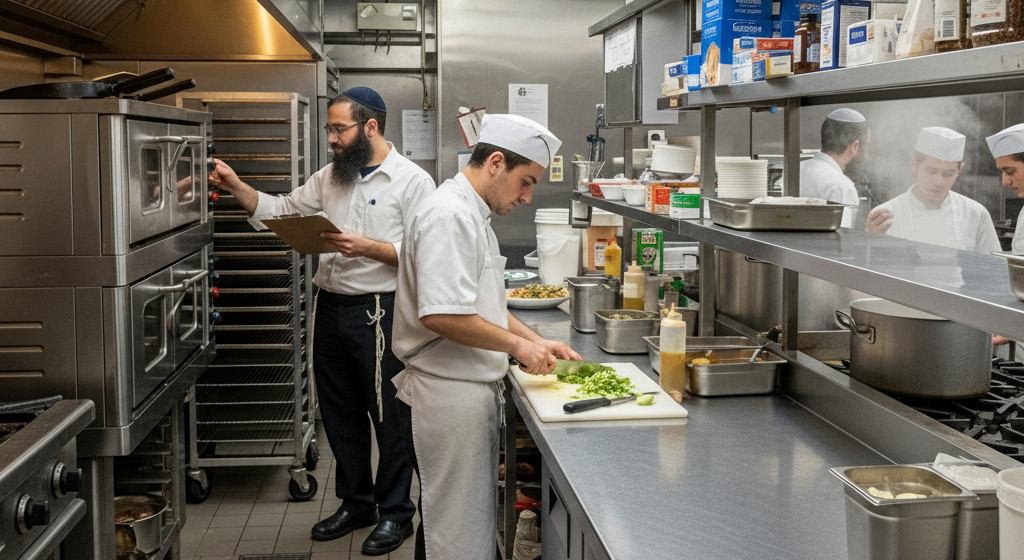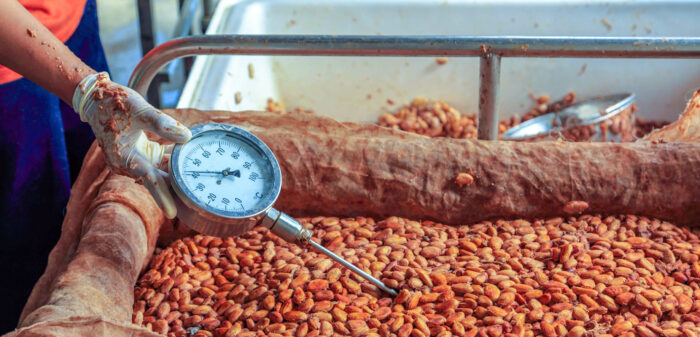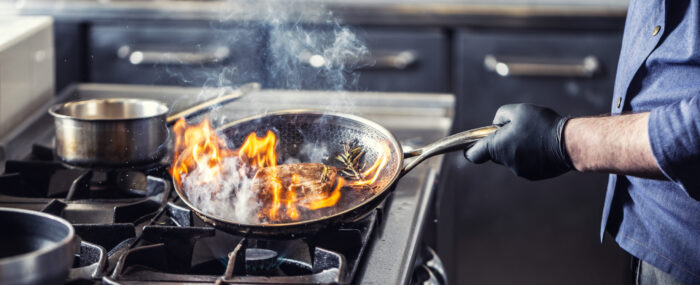
When you sit down to enjoy a meal at a restaurant or pick up a quick bite from your favorite takeout spot, you likely consider the menu, the flavors, and perhaps the ambiance—but have you ever paused to think about what goes on behind the scenes to ensure your food is kosher? In today’s fast-paced society, convenience is key, and ready-to-eat (RTE) meals have become the norm. Instead of buying individual ingredients to prepare a salad at home, many opt for a pre-packaged salad bowl, complete with dressing and toppings. But what does it take to make that meal kosher? Enter the unsung hero of kosher food service—the mashgiach. What exactly does a mashgiach do each day in a restaurant or commissary kitchen? Or is he merely משגיח מן החלונות —watching from the windows?
The mashgiach is often the first to arrive at a kosher restaurant, quite literally holding the keys to the operation. Without the mashgiach, the staff has absolutely no access to the kitchen or food storage! His punctuality ensures
that the staff can begin their work on time and that food preparation proceeds without delay. Upon arrival, the mashgiach checks that all areas which were locked overnight— such as refrigerators, freezers, stoves, gas lines, and outside storage units—are secure and in proper order. He then clocks in to both the ~ and the restaurant, confirming that he is present and on time for his shift. There are multiple crucial kashrus zones at a restaurant that are under the purview of the mashgiach—Bishul Yisroel, Pas Yisroel, ingredient receiving, outgoing deliveries, and produce inspection.
Bishul Yisroel
For most foods to be kosher, they must be Bishul Yisroel (cooked by a Jew). The exact foods that require Bishul Yisroel are extensive and beyond the scope of this article, but generally, they are foods that cannot be eaten raw and are fit to be served at a king’s table.
One of the jobs of the mashgiach is to ensure these foods are Bishul Yisroel. There is a well-known machlokes between the Mechaber and Rema regarding the extent of the Jew’s involvement in the cooking process. According to the Mechaber, the Jew must actually put the food on the fire. This is referred to as Bishul Beis Yosef and is the common practice among Sephardim. The Rema posits that it’s enough for the Jew to turn on the fire, and this is
the ruling followed by Ashkenazim. If food that requires Bishul Yisroel is not made with Jewish involvement, it is Halachically non-kosher, and keilim need to be kashered.
Most kosher certification agencies follow the Halachic rulings of the Rema, while offering the option to request Bishul Beis Yosef for those who require it. To ensure all food meets the required standard of Bishul Yisroel, one of
the mashgiach’s first responsibilities each day is to ignite all cooking equipment—stove burners, ovens, and soup kettles. He must be the one to initiate the cooking process.
Throughout the day, he also monitors these fires to ensure they remain lit. For instance, if a soup pot boils over and extinguishes the flame, it is the mashgiach—not the kitchen staff—who must reignite it. While employees are
trained never to turn on the flames themselves, the pressure of a busy lunch or dinner rush can lead to lapses. It’s the mashgiach’s job to maintain that boundary and uphold the standard.
Additionally, if a customer specifically requests Bishul Beis Yosef, the mashgiach must personally place that item—such as a burger—on the fire to fulfill the requirement.
Pas Yisroel
Pas Yisroel—baked goods that are prepared with Jewish involvement—is slightly different from Bishul Yisroel. While non-Pas Yisroel does not make an item non-kosher, many individuals are machmir in this area and will only eat bread or baked goods that are Pas Yisroel.
To make baked goods Pas Yisroel, Halachic authorities agree that a Jew must ignite the flame used in the baking process. In restaurants, however, many baked goods and bread products are sourced from outside vendors. This
means the mashgiach must carefully verify that all such items are indeed Pas Yisroel. In commercial production, this often involves checking for a specific Pas Yisroel sticker or lot number on each delivered box. If even one box
out of a shipment is missing the sticker, the mashgiach must investigate—checking if the sticker simply fell off, got stuck to another box, or if the item came from a non-Pas Yisroel production run.
There is also a lesser-known Halacha that adds complexity: If a Jew owns the establishment, then the leniency of pas palter (baked goods made by a non-Jewish professional baker) may not apply. In such cases, if a non-Jewish
employee lights the oven or places food like pizza into the oven (especially if there’s no pilot light or it was off), the product could be considered non-kosher, just like with bishul akum. While there are certain leniencies outlined by Rav Moshe Feinstein ztz”l, these are applied only under specific circumstances and require consultation with a posek.
Incoming Deliveries
One of the fundamental principles of keeping kosher is starting with kosher ingredients. It sounds simple—but in a busy restaurant, this requires constant vigilance. Deliveries arrive in all forms: some are dropped off before dawn (as early as 5:00 AM), others show up during peak kitchen hours, and sometimes, if a key ingredient is missing, a staff member may run out to purchase it locally. In every case, the mashgiach must verify that each item meets the kosher standards of the establishment. Kosher supervision isn’t just about ingredients—it’s about awareness, timing, and preventing mix-ups before they happen.
Outgoing Deliveries
The next step is to ensure the kosher consumer gets their food in a way that clearly shows that it is kosher. This means ensuring all deliveries are completely sealed with kosher tape when they leave the restaurant.
Produce Inspection
Last but certainly not least is produce inspection, one of the most demanding and time-consuming responsibilities of the mashgiach. Checking fruits and vegetables for insects requires precision, patience, and unwavering attention to detail. It’s not just about glancing at a head of lettuce; it’s a careful, methodical process that ensures the produce meets the highest kosher standards. Many places even have two mashgichim, and one is exclusively
responsible for checking produce early in the morning.
But the mashgiach doesn’t have the luxury of focusing on just one task. While he’s elbow-deep in leafy greens, a delivery of meat might arrive that needs immediate inspection. At the same time, a soup pot may boil over, requiring him to relight the flame. The cashier may be waiting for his signature to release a new order, and meanwhile, a customer who ordered a salad 20 minutes ago is growing impatient.
It goes without saying that the
mashgiach is proactive and will prepare all the vegetables required for that day’s service in the morning before service time, but sometimes the vegetable delivery is delayed or there is an unexpected order for another 100 salads.
Miscellaneous
And then there are all the other things that keep a kosher restaurant running: cracking and checking eggs, ensuring there is proper separation and segregation between fish and meat, sprinkling salt on leftover eggs or cut onions at the end of the day, and, of course, properly sealing and locking down the kitchen before closing.
This juggling act is part of the daily reality in a kosher kitchen. Behind every kosher meal is a mashgiach working hard to ensure that every standard is upheld—quietly, diligently, and often under great pressure. So next time you are in a restaurant and see the mashgiach, smile at him and say thank you. A little acknowledgement goes a long way.


 EN
EN  ZH
ZH  KR
KR  BR
BR  ES
ES  IN
IN  IL
IL  JP
JP 



